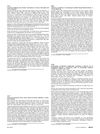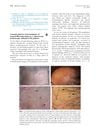 1 citations,
January 2017 in “Journal of rare disease research & treatment”
1 citations,
January 2017 in “Journal of rare disease research & treatment” Obesity is common in PCOS patients and early treatment is important for their heart and metabolic health.
 19 citations,
March 2022 in “International Journal of Environmental Research and Public Health”
19 citations,
March 2022 in “International Journal of Environmental Research and Public Health” Certain brain hormones and chemicals are linked to the development of Polycystic Ovary Syndrome.
 2 citations,
May 2023 in “Current Nutrition Reports”
2 citations,
May 2023 in “Current Nutrition Reports” Eating a Mediterranean diet and taking certain supplements may improve symptoms of PCOS.
 1 citations,
June 2023 in “Reproduction”
1 citations,
June 2023 in “Reproduction” Microglia, the brain's immune cells, may contribute to Polycystic Ovary Syndrome (PCOS) by altering the female brain's structure and function, with kisspeptin neurons and GABA neurotransmitters also playing a role.
 January 2025 in “Diagnostics”
January 2025 in “Diagnostics” Women with PCOS have distinct retinal changes compared to healthy women.
 6 citations,
January 2019 in “F1000Research”
6 citations,
January 2019 in “F1000Research” High triglyceride levels are a key factor affecting testosterone levels in women with PCOS.
 January 2022 in “Journal of family medicine”
January 2022 in “Journal of family medicine” Polycystic Ovarian Syndrome (PCOS) can cause chronic inflammation, mental health issues, and changes in gut bacteria, but a holistic lifestyle change can significantly improve these conditions.
 55 citations,
May 2019 in “Journal of Endocrinology”
55 citations,
May 2019 in “Journal of Endocrinology” Androgens are important for female fertility and could help in IVF treatment, but also play a role in causing PCOS.
2 citations,
July 2022 in “Journal of the Endocrine Society” Some women with PCOS have rare genetic variants linked to the condition.
 August 2023 in “Journal of Clinical Medicine”
August 2023 in “Journal of Clinical Medicine” Metformin lowers prolactin in women without PCOS but not in those with PCOS, where it reduces other hormones instead.
 3 citations,
January 2013 in “Annals of Tropical Medicine and Public Health”
3 citations,
January 2013 in “Annals of Tropical Medicine and Public Health” About 15% of adolescent girls in a region of India have Polycystic Ovarian Syndrome, which is more common in those born by cesarean, with wisdom teeth, or with central obesity.
 March 2023 in “Scholars international journal of obstetrics and gynecology”
March 2023 in “Scholars international journal of obstetrics and gynecology” PCOS is a complex condition that affects women's hormonal balance and metabolism, requiring lifestyle changes and medical management.
 April 2016 in “Journal of The American Academy of Dermatology”
April 2016 in “Journal of The American Academy of Dermatology” Hirsutism and acanthosis nigricans are reliable skin signs of PCOS linked to metabolic issues, while acne is not a reliable marker of the condition.
 April 2016 in “Journal of The American Academy of Dermatology”
April 2016 in “Journal of The American Academy of Dermatology” Women with PCOS often have more hair growth, skin darkening, and acne, which are linked to hormonal and metabolic issues.
 April 2016 in “Journal of The American Academy of Dermatology”
April 2016 in “Journal of The American Academy of Dermatology” Hirsutism and acanthosis nigricans are reliable skin signs of PCOS and suggest the need for further tests for related health issues.
 April 2016 in “Journal of The American Academy of Dermatology”
April 2016 in “Journal of The American Academy of Dermatology” Women with PCOS often have hirsutism and skin changes, which indicate a need for metabolic health checks.
 43 citations,
October 2019 in “Pediatric Research”
43 citations,
October 2019 in “Pediatric Research” Lifestyle changes are the main treatment for PCOS, which is a complex condition requiring early management to reduce its health impacts.
 20 citations,
January 2008 in “Reproductive Biomedicine Online”
20 citations,
January 2008 in “Reproductive Biomedicine Online” Sexual orientation does not affect the prevalence of PCOS or fertility rates in women undergoing artificial donor insemination.
 December 2023 in “Research in pharmacy”
December 2023 in “Research in pharmacy” Phytotherapeutic compounds and supplements can help manage Polycystic Ovarian Syndrome (PCOS).
 53 citations,
December 2015 in “JAMA Dermatology”
53 citations,
December 2015 in “JAMA Dermatology” Women with PCOS often have more body hair, acne, and skin darkening, and these signs are linked to metabolic issues like insulin resistance and high cholesterol.
 90 citations,
January 2021 in “Clinical Endocrinology”
90 citations,
January 2021 in “Clinical Endocrinology” Obesity increases the risk of developing polycystic ovary syndrome, and weight loss can improve the condition.
 50 citations,
December 2010 in “Bjog: An International Journal Of Obstetrics And Gynaecology”
50 citations,
December 2010 in “Bjog: An International Journal Of Obstetrics And Gynaecology” South Asian women with PCOS experience more psychological distress and have a poorer quality of life, especially in social relationships, with hirsutism affecting them more than obesity.
 18 citations,
June 2017 in “Journal of The American Academy of Dermatology”
18 citations,
June 2017 in “Journal of The American Academy of Dermatology” Trichoscopy helps diagnose frontal fibrosing alopecia, even with unusual patterns.
 1 citations,
January 2006
1 citations,
January 2006 Hirsutism is mainly caused by high androgen levels or sensitivity, with PCOS being the most common cause.
 5 citations,
September 2021 in “Dermatology Reports”
5 citations,
September 2021 in “Dermatology Reports” Skin problems like acne and excess hair in PCOS are common and linked to being overweight.
 68 citations,
January 2022 in “International Journal of Molecular Sciences”
68 citations,
January 2022 in “International Journal of Molecular Sciences” PCOS management includes lifestyle changes and medications, with ongoing research into repurposed drugs for better treatment options.
 1 citations,
May 2021 in “International Journal Of Medical Science And Clinical Invention”
1 citations,
May 2021 in “International Journal Of Medical Science And Clinical Invention” Women with PCOS may have a higher risk of severe COVID-19 due to hormonal imbalances and vitamin D deficiency.
 4809 citations,
January 2004 in “Fertility and Sterility”
4809 citations,
January 2004 in “Fertility and Sterility” The 2003 consensus updated PCOS diagnosis criteria and highlighted increased risks of diabetes and heart disease for those affected.
 4025 citations,
December 2003 in “Human Reproduction”
4025 citations,
December 2003 in “Human Reproduction” The 2003 consensus updated PCOS diagnosis criteria and linked PCOS to higher risks of diabetes and heart problems, recommending lifestyle changes to lower these risks.

The document concludes that accurate diagnosis and management of PCOS are crucial due to its associated health risks.





























